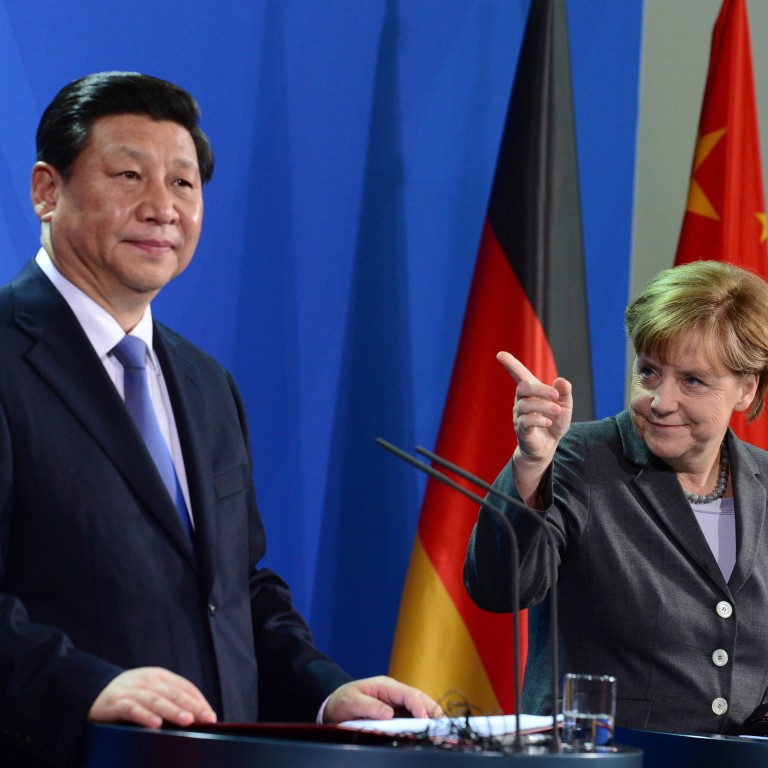
Germany won't be dragged into row between China and Japan, envoy says
As President Xi Jinping arrives in Berlin, ambassador to China warns that row over wartime history between Beijing and Tokyo is off limits
Germany does not want to be involved in the bitter exchanges between Beijing and Tokyo over their wartime history, the country's ambassador to China says.
Beijing has pointed to the European nation's atonement for its aggression in the second world war as an example Japan should follow to make amends for its invasion of China.
Michael Clauss told the - as President Xi Jinping arrived in Germany - that Berlin welcomed Chinese interest in how Germans had dealt with their history.
But he added: "We do not want to see our approach to history exploited to stir up tensions between Tokyo and Beijing. That is a different matter."

Berlin had close relations with both of Asia's leading economic powers and saw "no reason why we should be drawn into their bilateral territorial conflict".
Germany's position was well-known in Beijing, Clauss said.
The remarks came as Xi arrived on the first visit by a Chinese president to Germany.
Xi held talks with German Chancellor Dr Angela Merkel and was due to sign several economic and trade agreements. Chinese officials earlier denied overseas media reports that Xi wanted to visit the Holocaust Memorial in Berlin.
Beijing stepped up its diplomatic offensive against Tokyo after Japanese Prime Minister Shinzo Abe visited the Yasukuni Shrine, which commemorates the nation's war dead, including 14 leading war criminals.
Beijing drew a comparison between the shrine visit and the Nazis, with Chinese state television showing footage of former West German chancellor Willy Brandt falling to his knees in front of a memorial to victims of the Warsaw Ghetto uprising while on a visit to Poland.
Rebuking China, Abe compared Japan's relationship with China to that of Britain and Germany on the eve of the first world war. Clauss said that analogy did not mean war was inevitable, but he urged China and Japan to engage in substantial dialogue to reduce the tensions.
Reconciliation in Europe after the second world war was not only the result of Germany's efforts but the effort of all European nations, he said.
We don't want to see our approach to history exploited to stir up tension
"After all the catastrophes of the 20th century, Europeans finally realised that they had to find a different way," he said.
"Germany had to come to terms with its wartime history, and at the same time it was essential that other European nations took steps towards reconciliation and accepted Germany's sincere apologies."
Clauss said European nations had also created a system of rule of law, settling disputes through the European Court of Justice or negotiations.
Abe has said his government will adhere to apologies for wartime behaviour made by past cabinets in 1993 and 1995.
While in Germany, Xi was expected to cover a wide range of issues in talks with Merkel, with the situation in Ukraine likely to be prominent, Clauss said.
China abstained in a UN Security Council resolution condemning the Moscow-engineered referendum that led to Crimea joining Russia, a move that Clauss said was a signal Beijing had no intention of taking a stronger line on the issue. "China seems ambivalent. On the one hand it is trying not to step on Russian President Vladimir Putin's toes, and on the other hand China avoids openly supporting Russia," he said.
But Germany and China could still discuss ways to prevent the conflict from escalating, he said. "It is important we prevent the situation in Ukraine from deteriorating and rein in Russian ambitions."
An expansion of bilateral trade and financial co-operation will be discussed during Xi's visit. Companies of both nations, including carmakers, are set to sign a series of agreements, and a deal to make Frankfurt a centre for offshore trade in yuan was signed yesterday.
Chinese companies have invested €1.2 billion (HK$12.85 billion) in Germany and Clauss expected the figure to grow.
"We believe that foreign investors buying up domestic companies is a healthy process and should not be subject to restrictions on either side, neither in Germany nor in China," he said.
Human rights were also part of ties, Clauss said, adding Germany saw "some worrying developments" with the arrest in China of peaceful activists.
Clauss said Merkel was expected to visit China in summer and Premier Li Keqiang would visit Germany in October.

